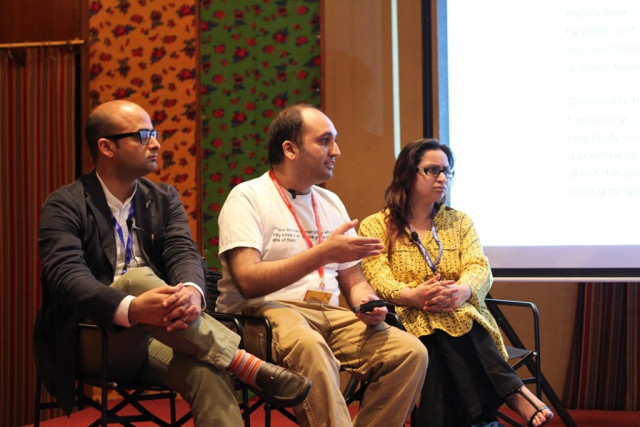Social Media Mela: Should brands build or buy blogger loyalty?
Bloggers insist that lack of restrictions, editorial control on them gives their opinions more value than journalists.

Social Media Mela: Should brands build or buy blogger loyalty?
A debate revolving around this question and more was held between those from the corporate world and bloggers at a session titled “Corporate Blogger Meetups: Building or Buying Loyalty?” on the first day of the Pakistan-India Social Media Mela on Friday.
During the session, bloggers insisted that the lack of restrictions and editorial control on bloggers gave their opinions greater value for corporations.
“News stories are regulated and managed by editors to make sure the content does not come off as too promotional, whereas bloggers are bound by no such restrictions and are able to promote or discredit a certain product as they feel is justified,” said Shoaib Taimur, a panellist and regular blogger.
“The beauty and risk of blogs is that they lack objectivity,” said Taimur.
“Corporations cannot dictate content to bloggers, as they do in press releases,” added Faisal Kapadia, a renowned blogger.
But the speakers admitted there were certain drawbacks that came with such freedom.
Bloggers who have written negative reviews of products, or have not covered certain events are not invited to future events by the same corporation, said Aly Balagamwala, commonly known as DiscoMolvi on social media. Dr Awab Alvi, another blogger, added to this, stating that he was aware of many bloggers, including himself, who had not been re-invited to certain events due to the critiques published on their blogs.
Discouraging negative press through freebies?
Many of the bloggers stated that bribing them with ‘freebies’ challenged the integrity of the blogger and the content could be compromised. They reiterated that negative as well as positive feedback should both be taken with a pinch of salt.
Raheel Khursheed, a panellist and director communications at Change.org, responded: “Social media takes up a lot of space, as far as mind space is concerned, so the gift tends to determine the outcome of what a blogger writes.”
Samra Muslim, another panellist from the corporate world clarified that there was no agreement signed between corporations and bloggers to write a good or a bad review. She explained that the intention of the corporation is “not to buy the bloggers loyalty but build it based on experience”. She went on to state that fashioning an opinion is not the intention of the corporation, but trying to get someone to advocate their product is.
The general view of the panellists highlighted that if a blog was reflective of any influence from a firm, corporation or brand it would lose its credibility with its audience.
Issue of reach
“Why would corporations be willing to pay bloggers to write about them when total reach is of a few thousand people?”
Responding to this question posed by the audience, Muslim giving an example of the number of attendees at the Social Media Mela, said that social media was now a forum that was big enough to demand attention and “corporations could not ignore social media” any longer.
The verdict? The need to blog, tweet and have a piece of the social media pie is felt by corporations, which are now trying to cope with the alacrity of change in social media trends.



















COMMENTS
Comments are moderated and generally will be posted if they are on-topic and not abusive.
For more information, please see our Comments FAQ